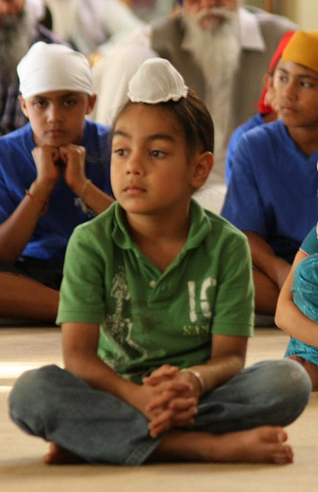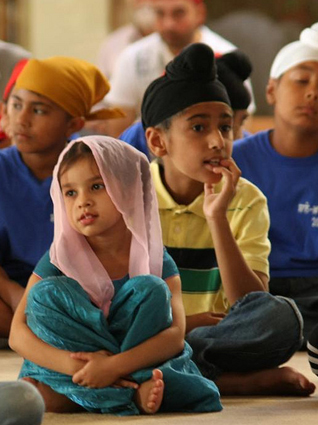| THE ROUNDTABLE OPEN FORUM # 81 I received an urgent cry for help the other day. The note said: “Please advise and help … relating to young Sikh kids marrying kids from other cultures, religions and races, and how it is affecting their parents. I am also affected by it and I don’t know a way out.” I have reproduced the words verbatim from the note. I’m no Ann Landers. I have looked around and I can’t find anyone who fits the bill. My heart aches for this parent and I want to help. I am a parent as well, and these issues are never far, never have been, ever since I became a father. It’s one of the many issues one carries around all the time, almost as if in a knapsack strapped to your back, if you are an immigrant, a member of a minority … actually, no matter who you are today. It seems to touch everyone everywhere, to some degree or the other. If not yet, then trust me, it’s lurking around the corner, waiting to pounce on you. In the absence of something better - and until something better comes along, which will, for sure - here are my thoughts. Offered here not as answers or solutions, but something to chew on … a starting point of sorts, for a conversation, a dialogue. I don’t want to dwell on the basic facts which I'd rather, at the very outset, put aside as ‘givens’. They are: We are living in a world where all of the old mores have been either knocked down or are up for grabs. The old norms are gone, no new ones have been formulated yet to replace them. We now live, more than ever before in human history, in a multi-racial, multi-cultural, multi-religious society, where even boundaries that were once etched in stone are being chipped away: e.g., national, gender, lingual, etc. We also live in a society which increasingly treasures its freedoms and the rights it accords to all … at least in law. So, while we relish and cherish these same rights and freedoms, we also wince and bristle when we are reminded, from time to time, that those around us are equal beneficiaries of the same freedoms. Thus, as many of us have moved to other countries seeking freer societies, we now find ourselves surrounded by laws and mores which do away with the traditional powers of control that parents had over their adult children. All adults, parents as well as their progeny, are free to choose … and have the right to do what they deem best for themselves. As a result of all of the above, we live in the most interesting of times ... to borrow a euphemism. Particularly because we’ve found it easier to embrace our own new-found freedoms than we have in accepting the freedoms of others, especially when they collide with ours. I have always found it easy to understand this dynamic by reminding myself of the man who was walking down a street, merrily enjoying the scenery, as he whistled a tune and swung his umbrella around to keep the beat. It didn’t take long before he narrowly missed hitting a passer-by with his umbrella. The irate pedestrian chided him for his carelessness and demanded that he keep his umbrella in check. “But, sir,” replied the man, “this is a free country, and I can do what I please! It’s for you to be on the look out, and steer out of my way.” “That may be true,” fumed the victim as he grabbed the man by his collar and shook him, “but remember, your freedom ENDS where my nose BEGINS!” That’s the law. Now for the added dimensions: our duties and obligations as parents, our dreams and aspirations as Sikhs. This brings me to a few more reality checks. We as a community, some of us as parents as well, have neglected our duties in a number of ways. Firstly, we have not taken any timely steps to impart our Sikhi values to our younger generations. These steps need to be taken from before the children are born, not AFTER they have become adults. Secondly, we have built no institutions, created no mechanisms, nurtured no traditions or customs, whereby our young can meet others of the opposite sex in a healthy, social environment, with the goal of preparing them for the day they will need a life partner. Thirdly, in bringing up our children, we have forgotten the heady days of our own youth, and now willingly slide into lives of total denial over the hormonal changes that our own teenagers begin to experience. All we do is dictatorially suppress them, or more accurately, insist that our children pretend as if they do not exist. Last but not least, we then express shock and indignation when our children who, having grown up and fled from our oppressive embraces to university or workplace, suddenly encounter a ‘normal’ world which is populated mostly by those who are not Sikh … and, with nature doing what it does best, sometimes fall in love. Given the odds, the person they have fallen in love with may not necessarily be a Sikh. Why does this happen? Because we as parents have spent all our time and energy throughout their growing-up years in keeping them away from Sikhs of the opposite sex! Just think about it. There are a few other complicating factors, but I think the sampling I have given up till now adequately lays out our challenges. I do not present these as an exercise in self-flagellation over past failures, but in order to face them headlong and accept them as givens, in order to figure out where we go from here. TO PARENTS If your son/daughter has come to you to announce that he (I’m going to stick to one pronoun, for convenience) has fallen in love with a person outside the community: There’s no point blaming him for it … it isn’t his fault. It is nobody’s fault. It’s a fact staring you in the face. Deal with it. The first important thing is to help him determine whether it is indeed love, and not infatuation. You may be handicapped in that neither you nor your spouse has any experience in this sort of thing - your marriage was arranged, and you have lived in a ‘traditional’ marriage, albeit a good one. Seek help, if you don’t know what to do. From young men and women - Sikhs! - who have already lived through this. Not old-timers. Don’t swallow what others say, hook, line and sinker. Talk to as many as possible, but use your own common sense. Don’t lecture him. Don’t threaten him. Don’t bribe him. Work with him. Share in his joy, genuinely. If he’s happy, what more could you want? Now your task is to help him in his chances of having a long, happy marriage. Remember, if you haven’t done this yet with him - in the last 20 years - it is too late to be telling him now about Sikh values and traditions, or your desire to have a Sikh daughter-in-law. What you want to do is help him act maturely. To make sure he is sure. To make sure she is right for him, and he for her. That there are no impediments - let’s take some wild examples: drug or alcohol abuse, criminal record, insanity, etc. Is there economic or educational parity? Intellectual? Social? Spiritual? Sexual? And you need to find out from him how important Sikhi is to him? Does she know it and how does she feel about it? THE SON/DAUGHTER How important is Sikhi in your life? Is it important for you to see it remain central to your life? Is it important for you to pay heed to your parents’ wishes as to what kind of household you will create for yourselves, or do you simply want to do your own thing? If the answer is clearly that Sikhi is not important and he needs a complete breakaway from family traditions, the rest is easy. The parents might as well sit back and try and enjoy, to the extent they can, what he wants to do with his life. However, if he wants to work with his parents hereon, despite the fact that he has chosen his own life-partner, here are a few things he needs to consider. Marriage, any marriage, is a challenge. In today’s world, any marriage - no matter who marries who - will have the odds stacked up against it. That’s a fact of life, not dependent on any variables. Throw in a few more wrenches into the mix, and the risk factor increases … or, shoots up. Inter-cultural, inter-faith, inter-racial … these factors are all complicating factors. They increase risk, not reduce it. So, if Sikhi is important, then it must be made clear to the other that he wants to continue with Sikhi as his faith, even though she may want to continue with her own. Ideally, if the spouse subscribes to his beliefs, it will be easier. CEREMONY If Sikhi is important, then you want an Anand Karaj. It is the only religious ceremony which welcomes participation by other faiths, and doesn’t look askance on “others”. It will warmly welcome both families unconditionally, and give each ownership of the ceremony. CHILDREN If Sikhi is important, you may want to make it clear that you want to raise your children as Sikh. It is meaningless to say, “We’ll see later”, or “We’ll give them exposure to both.” Because, if Sikhi is important to you, then you need to agree that they’ll be brought up as Sikhs. If you can’t agree on this, postpone all your plans until you have sorted this one out. This issue is not only a marriage-breaker, it is a recipe for hell on earth. For all. IN-LAWS Have you met her parents, her brothers and sisters? Her friends? And she yours? How do they get along? Is each side accepting of the “other”, without feeling superior or condescending, or does it feel a deep sense of failure on the part of their child, or their own? You need to figure this one out well in advance, otherwise, again, it’s a marriage breaker, and/or a recipe for hell. PARENTS & SON/DAUGHTER Remember, love can indeed last forever, but the willingness to accommodate each other’s whims has a very short life-span. No more than two years. So, everything you assess should be free from the glow of “love” and should have legs firmly on the ground. The best you can do, under the circumstances, is talk a lot amongst yourselves, without anger, without guilt, without blame, without regret … simply to look at everything in reality, making sure the two key parties understand exactly what they are getting into, what their strengths and weaknesses are, and the minefields that surround them in every direction. [Reminder: All of my comments apply equally to sons and daughters.] FINALLY No matter what, it ain’t going to be easy. You’re never going to be able to, no matter what each of you do, guarantee a successful marriage. Even if the parents are the King and Queen of England, the son a Prince, the girl a princess, and the whole world is there to cheer on! So, work at it as if it is once-in-a-lifetime event … and bring every ounce of joy out of it to the fore, for all to share. [You’re right, I am no Ann Landers.] THE ROUNDTABLE OPEN FORUM Would love to hear your thoughts on this. But a caveat: please do not bother to lecture on how upset you are over a Sikh marrying a non-Sikh, and how terrible the idea is, or how much against the maryada it is. Sadly, because of our collective and individual actions and omissions to date, it’s too late in the picture for some in the community to be pontificating or complaining. The question is: where does one go from here? The rest of you, those of you who don‘t have to worry about all of this for a while: please give all of this some serious thought. If Sikhi is truly important to you, I suggest you start worrying about it NOW! |
 Images above and first from the bottom - details from photo by Gurumustuk Singh. Nishaan Sahib, from painting by Kanwar Singh [ArtOfPunjab.com]   |
